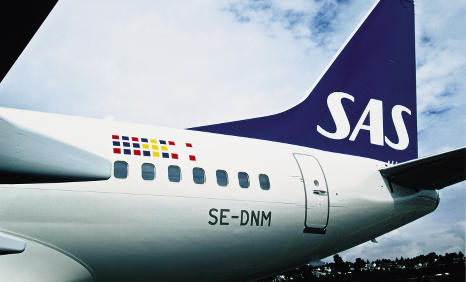SAS
Scandinavian Airlines cancels 110 flights
Scandinavian Airlines (SAS) cancelled 110 flights on Wednesday and Thursday in a bid to to prevent passengers from getting stuck in transit due to an impending strike, the airline announced today.
Published: 20 May 2015 22:14 CEST

An SAS plane on the ground. Photo: SAS
Most of the cancelled flights are Swedish domestic flights, but passengers travelling to major destinations in Norway and Denmark are also affected.
“Our travellers will suffer in the case of a conflict and I can only regret that we are now facing a situation threatening to affect many passengers in a negative way,” Rickard Gustafson, the company's chief executive said in a statement.
Some 430 Swedish pilots are due to go on strike by midnight if an agreement with the airline cannot be reached, affecting thousands of travellers on long and short haul flights.
SAS is due to begin mediation with pilots in Norway next week, after SAS failed to reach an agreement with about 300 pilots in the Norsk Cockpitforbund.
SAS has already reached agreement with the half of its Norwegian pilots who are members of another union and three days have been set aside for the negotiations.
That means that the Norwegian pilots could go on strike on Thursday next week if an agreement is not reached.
SAS is struggling in the face of growing competition from low cost airlines, pushing it into a loss for the first three months of the year.
The Swedish Airline Pilots Organisation claimed in a press release that changes to wages, pensions and working hours amounted to an effective 40 percent cut in remuneration, and are therefore demanding a moderate wage increase from the airline.
SAS reject that the pilots are being offered a deal that would mean further cutbacks.
”The on-going negotiations are not about reducing wages or pensions,” We want to forge modern Scandinavian collective bargaining agreements,” Malin Selander, the company's press officer told Sweden's Expressen newspaper.
Url copied to clipboard!


 Please whitelist us to continue reading.
Please whitelist us to continue reading.